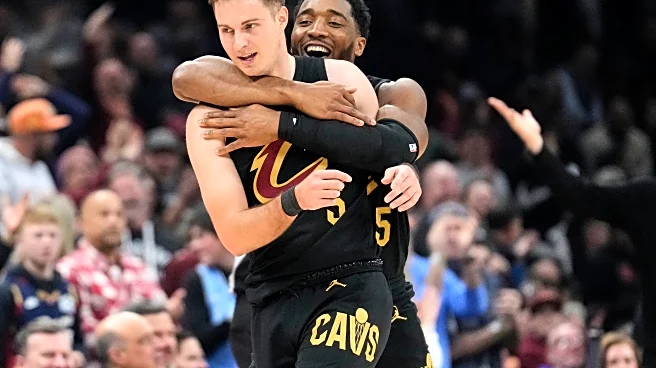What's Happening?
Travis Hunter, a rookie for the Jacksonville Jaguars, is set to make history by playing both offense and defense in the upcoming NFL season. Hunter, who was selected as the second pick in the 2025 NFL draft, is known for his exceptional performance in college football, where he excelled as both a wide receiver and cornerback. During his Heisman Trophy-winning season in 2024, Hunter recorded impressive statistics, including 92 receptions, 14 receiving touchdowns, and 1,152 receiving yards as a wide receiver, along with 31 tackles, 11 pass breakups, and 4 interceptions as a cornerback. Hunter's unique ability to play both positions at a high level makes him a standout prospect, and he has expressed his commitment to maintaining this dual role in the NFL.
Why It's Important?
Hunter's decision to play both offense and defense challenges traditional NFL roles and could influence how teams utilize versatile players in the future. His success could pave the way for more athletes to adopt similar dual roles, potentially altering team strategies and player development. For the Jaguars, Hunter's versatility offers strategic advantages, allowing them to maximize his talents on both sides of the field. This approach could lead to innovative gameplay and provide the team with a competitive edge. Additionally, Hunter's performance will be closely watched by fans and analysts, as it may redefine expectations for rookies entering the league.
What's Next?
As Hunter prepares for his debut season, he will focus on balancing his workload to ensure peak performance during games. His training regimen includes sprinting with belts, sleds, and weights, although he plans to adjust his pace to conserve energy for game day. The Jaguars will likely monitor Hunter's progress closely, assessing how his dual role impacts team dynamics and performance. If successful, Hunter's approach could inspire other teams to explore similar strategies, potentially leading to a shift in how players are utilized in the NFL.
Beyond the Headlines
Hunter's dual role raises questions about the physical and mental demands placed on athletes who take on such responsibilities. It highlights the importance of understanding one's limits and the need for effective training and recovery strategies. Additionally, Hunter's journey underscores the evolving nature of football, where adaptability and versatility are increasingly valued. His success could influence how young athletes approach their development, encouraging them to cultivate skills across multiple positions.










